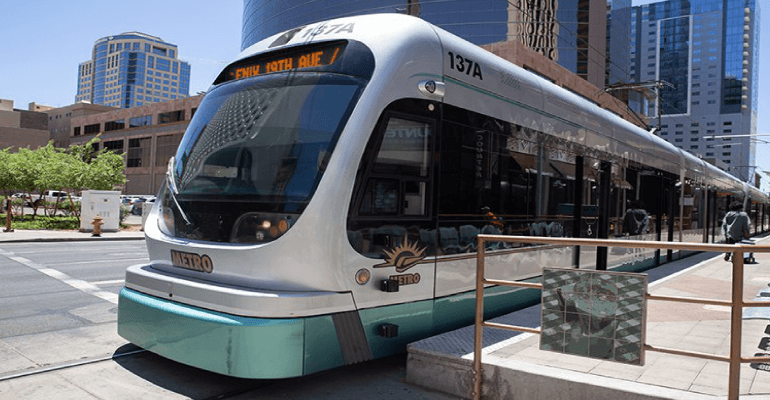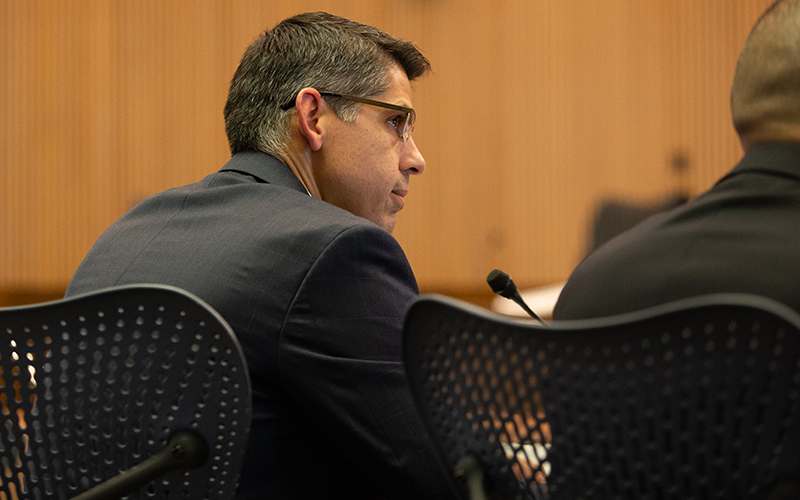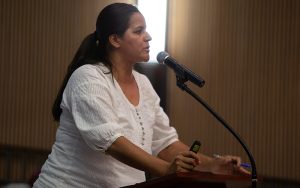
By Nick Serpa and Jessica Alvarado Gamez
PHOENIX – The Phoenix City Council on Wednesday voted 6-2 to proceed with the development of the South Central light-rail extension after a contentious meeting with residents earlier this week.
Newly appointed Mayor Thelda Williams voted in favor of moving forward with the project, saying it’s a good project and it will give people the “opportunity to be employed downtown.”
Councilmembers Jim Waring and Kate Gallego voted against moving forward. A grassroots community group had asked the council to delay the project by 90 days.
Williams had agreed to hear from residents about the project. And during an hours-long public hearing Tuesday, people packed the council chambers: Some speaking in support of the extension and many questioning the city’s transparency and the design of the 5.5-mile project, which is scheduled to begin late next year.
Phoenix and Valley Metro officials defended their public-outreach efforts and warned that any delay could jeopardize federal grant money helping to pay for the $700 million project.
Deputy City Manager Mario Paniagua said the project faces a July 31 deadline to apply for the “federal engineering phase” of the project and planners would have to “start all over” if they miss that deadline.
Responding to questions from council members, Valley Metro CEO Scott Smith said Valley Metro held more than 380 community meetings in South Phoenix regarding the extension, which will stretch from downtown to Baseline Road. He said meetings with affected business owners have taken place “well in advance of construction.”
Smith also noted that Proposition 104, the sales-tax increase to pay for the extension and other Phoenix transportation projects, was approved by 55 percent of voters in August 2015; the approval was 75 percent of voters along South Central Avenue, he said.

Councilman Michael Nowakowski, who represents parts of downtown and southwest Phoenix, asked why the plan doesn’t allow for four lanes along Central Avenue.
“As we talked about two months ago,” Paniagua responded, “the setup of Central Avenue is limited.” Many buildings abut the sidewalk, he said, which would require demolishing portions of structures to accommodate tracks and four lanes for car traffic.
Nowakowski also criticized Valley Metro’s efforts to educate and listen to the public: “We haven’t done our homework.”
In response, Smith said: “Part of those 380 meetings that were held over the last three years were with specific businesses.”
Nowakowski said many of the meetings were poorly attended, and many community voices might not have been heard.
Smith refuted this, saying Valley Metro hung about 20,000 door hangers related to the extension, and more than 150 people showed up for some meetings. He said Valley Metro had provided opportunities for community input and met federal requirements for public outreach.
“Unless you knock,” Vice Mayor Jim Waring said, “nobody cares about the door hangers.”
“If the council wanted to get rid of the South Central light rail,” he said, “we can’t do it unilaterally. But we have time to send something to the ballot.”
Much of the public response at Tuesday’s hearing focused on the plans to reduce traffic along Central Avenue to two lanes from four.

“We were not told any details … of the two lanes,” said Jimmy Cluff of South Phoenix. “We weren’t at those meetings because we didn’t know about them.”
Celia Contreras, owner of Tony’s Window Tinting in South Phoenix, spoke against the upcoming light rail extension at a Phoenix City Council special session. She and others expressed a variety of concerns about the project, including reducing the number of lanes along portions of Central Avenue. (Photo by Nick Serpa/Cronkite News)
Celia Contreras, who owns Tony’s Window Tinting on Central Avenue and the founder of community group 4 Lanes or No Train, said Valley Metro officials still have not met with her as promised to discuss ways to help her business during construction. “We receive so many excuses.”
She said light rail could improve south-central Phoenix, but not with the current design, which she contends would cause traffic issues and negatively affect businesses along the line.
“We’re not against the light rail. We’re against the design of the light rail.”
Contreras also said she doesn’t believe voters were properly informed. Several of the conversations about the plans were held at festivals and events where it’s difficult to have meaningful, in-depth conversations.
“You have to listen, because you never want to listen to us,” she told Valley Metro and the City Council.
James Neal, co-owner of the Food City at Jesse Owens Boulevard and Central Avenue, said that although residents voted for Prop. 104, there wasn’t language indicating lane reduction on a “major arterial” road.
“One lane is not going to spur development,” he said, adding that roads are just as important as public transportation.
Victor Bodellas, a father of five and a South Phoenix native, also supports the light rail, but he wants the city to create a neighborhood improvement plan to fix streets and sidewalks in the area.
“We need transportation options to connect our people to each other,” he said. “Phoenix has been designing communities around the car for way too long. Healthy communities are designed around people, not cars.
“I trust we can work together to survive the four-year period of construction. Many of us have waited a very long time to receive an equitable investment of this magnitude in our community.”
Councilman Sal DiCiccio, who represents north-central Phoenix, said the money allocated for the extension could be put to better use elsewhere in South Phoenix, but Councilwoman Kate Gallego, who represents southeast Phoenix and parts of downtown, noted that the project’s $6 billion in federal grants would go to other states if not used for light rail in Arizona.
“We need to keep our promises,” Gallego said. “The voters spoke, and they said they really wanted this investment. This is an important opportunity in a community that doesn’t always get big investments.”
William “Sparky” Smith, a member of the Phoenix Citizens Transportation Commission, said he changed his mind about the extension after hearing about the lack of transparency.
“We’re not addressing the 800-pound gorilla in the room, and that is that elections have consequences,” he said.
